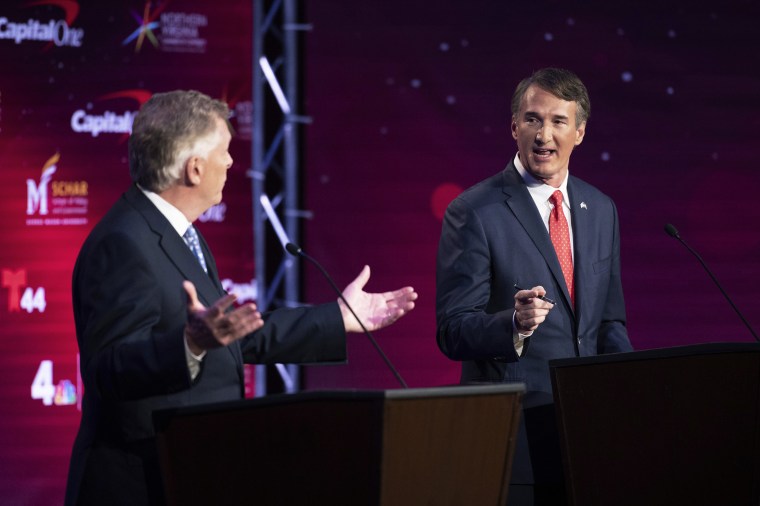WASHINGTON — With less than two weeks to go, polls show an incredibly tight race in Virginia’s gubernatorial election, with a survey out Wednesday finding the race in a tie.
“There are a lot of indicators that this is a close race, and it fits the basic pattern of how Virginia gubernatorial races have performed in the past — the race often breaks against the White House,” said Kyle Kondik, an election analyst at the University of Virginia’s Center for Politics.
Democrat Terry McAuliffe has led Republican Glenn Youngkin since the beginning, but his advantage has narrowed in recent weeks to within the margin of error in several recent polls.
Youngkin has claimed momentum as undecided voters come off the fence, while Democrats are scrambling to turn out their base for the Nov. 2 election and convince moderate suburban voters that Youngkin is more dangerous than he appears.
“Just like in midterm elections, this is an off-year election, and the nonpresidential party often has an enthusiasm edge,” Kondik said. “Many polls have shown that the GOP base is more fired up than the Democratic one.”
A Monmouth University survey released Wednesday showed the race dead even among registered voters — 46 percent to 46 percent, a shift from the 5 percentage-point lead McAuliffe enjoyed in Monmouth’s poll last month. Republicans also expanded their enthusiasm advantage.
The biggest swing came from independents, who now break for Youngkin, 48 percent to 39 percent, after giving McAuliffe an edge in the pollster's September survey. McAuliffe’s advantage among women also shrunk from a 14-point lead last month to a 4-point lead now.
“Suburban women, especially in Northern Virginia, have been crucial to the sizable victories Democrats have enjoyed in the commonwealth since 2017,” said Patrick Murray, director of the Monmouth University Polling Institute. “However, their support is not registering at the same level this time around. This is due partly to a shift in key issues important to these voters and partly to dampened enthusiasm among the party faithful.”
Recent polls from Fox News, CBS News, Christopher Newport University and Emerson College all tell similar stories, though McAuliffe has maintained his lead in all of the two dozen publicly available polls from the past three months, except for two conducted by Republican pollsters.
“Since we polled these races in late August, Democratic leads have shrunk, and the contests for governor and lieutenant governor now stand within this survey’s margin of error,” Rebecca Bromley-Trujillo, research director at the Judy Wason Center for Public Policy at Christopher Newport University in Virginia, wrote in a memo outlining the Oct. 8 poll. “Independent voters have moved significantly toward all three Republican candidates. Republican voters are more enthusiastic about voting than Democrats.”
Of course, polling has had a difficult run in recent years with several high-profile misses thanks to declining participation rates among voters asked to participate in surveys and a host of other challenges.
Democrats are quick to note, for instance, that the Monmouth surveys showed a narrowing race in the lead up to the 2017 last governor's race, with their final survey showing Democrat Ralph Northam ahead by a single point. Northam ended up winning by 9.

